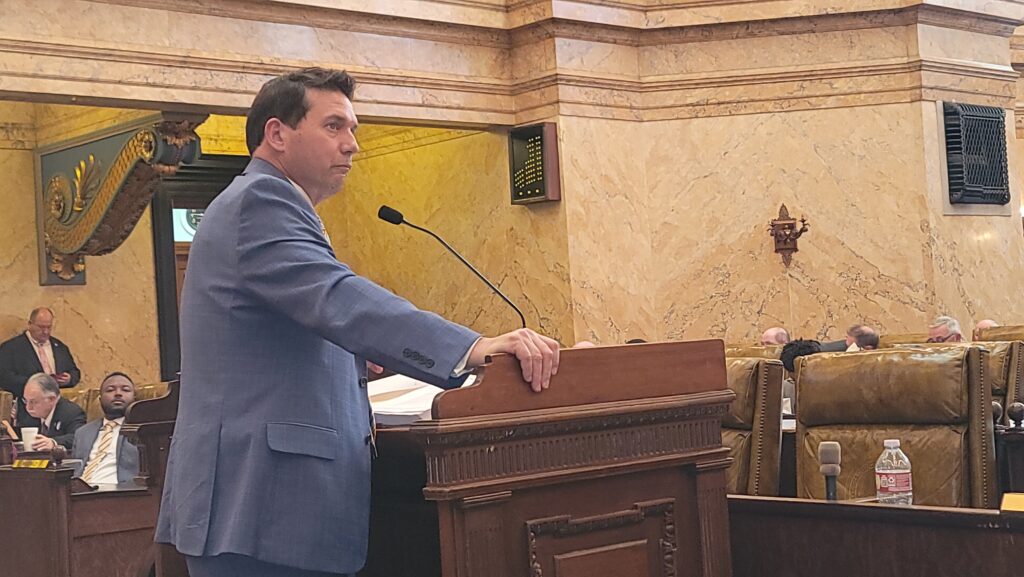
- State Health Officer Dr. Daniel Edney says something needs to be done to mitigate “just objecting so you delay the process” when new healthcare facilities or services are proposed.
Within Mississippi, discussions to significantly reform Certificate of Need (CONs) laws have not yet been successful, but talks are continuing and reform advocates hope changes are on the way.
The beginning of the CONs
Certificate of Need laws were established under President Gerald Ford’s Administration nearly 50 years ago. CONs require new medical facilities to obtain government permission before opening.
Cade Yates, Deputy State Director for Americans for Prosperity, said the federal mandate began with the goal of encouraging medical industry investments and reducing healthcare costs. Yates contends the idea to restrict the number of healthcare facilities in America did not work as planned.
“Unfortunately, over the next ten years it was so disastrous that the feds repealed it under (President Ronald) Reagan and left it up to the states,” Yates said.
To Yates, instead of making healthcare cheaper and improving the quality of care, CON laws did the opposite.
“Because you know that any time the government tries to have a heavy hand top-down approach it generally leads to worse outcomes,” Yates added.
Matthew Mitchell, a scholar at the Knee Center for the Study of Occupational Regulation, points out that after Congress eliminated the federal CON mandate, “several states repealed their CON laws while others have significantly pared their programs back.” Mitchell says, “Today, 4-in-10 Americans live in a state without these rules.”
Yates described those states as having better healthcare options at a better price.
Dr. Daniel Edney, State Health Officer for the Mississippi Department of Health, said CON laws were put in place to ensure that when a medical service is proposed there are enough patients to support it. He said CON laws also ensure the applicant seeking to deliver the service has the funding to support what they propose.

CON laws tend to apply to the creation and expansion of hospitals, long-term acute care facilities, nursing homes, home health agencies and dialysis units. The persons or company interested in opening or expanding a facility submits an application and the Department of Health reviews the proposal to determine if the new practice is needed in a specific community.
Problems with CON
According to Mitchell, the “process can take months and can cost tens of thousands of dollars in fees and much more in compliance cost. Existing providers are allowed to oppose the applications of their would-be competitors and the regulator may deny an application if he or she thinks that the new service will duplicate an existing one.”
Mitchell argues that what the law “calls ‘duplication’ customers would call ‘competition.’”
Dr. Edney said that objections by competitors can lead to an 18-month to two-year delay in the approval process. Additionally, because a legal challenge is possible, the dispute can be quite costly, creating a financial hardship on the applicant.
The CON application process is also required when an existing facility wants to expand services or purchase new medical equipment.
When asked how many CON applications are disputed, Dr. Edney said, “I would say virtually all of them.” As such, he proposes some sort of “barrier” for those making objections.
Under the current system when an objection is made, the applicant is required to pay the legal fees when the matter is taken to court. Instead, Dr. Edney proposes a bond be paid by the objecting agency or business. One example was a hospital in the Delta that was ready to make an investment in a much-needed surgery center. Opposition from another hospital in the area ultimately caused that attempt to provide care to fail.
“We have to do something to mitigate that problem of just objecting so you delay the process,” Edney said.

State Representative Lee Yancey (R) has been working on legislation to address the problems that Certificate of Need laws cause for years but has seen little success thus far.
“I still think it’s a regulatory burden that’s anticompetitive and I think that we would have a much more open healthcare market if we could get rid of some of the red tape,” Yancey told Magnolia Tribune.
One of the problems Rep. Yancey sees with the CON laws is that Medicaid reimbursements do not match the actual cost of the services being provided, cutting into already tight profit margins.
“If something costs $100, Medicaid ought to reimburse $100,” Yancey described. “It doesn’t make sense for it to reimburse $80 for a $100 service.”
Rep. Yancey said CON laws also limit investment in communities that need it. He offered the example of a company that wanted to open a medical rehabilitation facility in Flowood. When representatives of the existing medical rehabilitation opposed, the process stopped moving forward.
“So, Flowood missed out on having a new business come into their city with a $10 million investment,” Yancey said.
To Rep. Yancey, CON laws only work to limit Mississippians’ access to healthcare.
“Why should the state care?” Yancey asked. “If people want to go into business, let them go into business. The ones that make it, make it; the ones that don’t, don’t.”
Rural Mississippians are often most affected by CON regulations since residents already have limited access to care. CON further restricts care by restricting competition, Yancey said.
“If you’re out in rural Mississippi somewhere, sometimes the best you can hope for is to get to the place where they can triage you and the ones that are in the worst shape can be air lifted or rushed to an ER in one of our larger hospitals,” Yancey described.
CON reforms debated
A select committee was formed by Speaker of the House Jason White (R) this summer to review the state’s existing CON laws. Rep. Yancey is curious to see what comes out of those discussions. He would like to see the government get out of the way of business and commerce.
READ MORE: Speaker White appoints members to Select Committees on Tax Reform, CON Reform
“I really would like to see us move the ball,” Yancey said. “It doesn’t matter if it has my name on it or not, I just want to see good change come to Mississippi in these areas.”
While such laws are often too restrictive, there are areas of healthcare where Rep. Yancey and Dr. Edney agree CON laws are needed. Yancey said it makes sense to limit the number of personal care and nursing homes in the state due to the fixed reimbursement rate from Medicaid. If too many of those businesses are allowed to operate, he said many will be unable to reach a capacity where it is profitable.
To Dr. Edney, CON laws protect existing facilities from an outside company cherry picking desirable services that produce more profit. Allowing cherry picking in the healthcare arena could create situations where resources are taken away from existing facilities, he said.
“It keeps for-profit entities from dropping a service into a community that is only going to feed off the cream and not provide more comprehensive services that a rural hospital would provide,” Edney added.
Dr. Edney admits there are faults with the existing CON laws, but he is clear that he does not advocate for their total elimination.
“So, it is a huge balance between premarket competitive issues versus not disrupting the healthcare needs of a small community,” Edney said.
Another problem Edney’s office deals with concerning CON laws pertains to the how fees are collected. Those fees have to be subsidized by the Department of Health because they do not cover the cost incurred by the Department to run the program.
Dr. Edney said a rate increase implemented last year has helped, but the agency is still in the red by roughly $250,000 annually. He estimates that before the rate increase, the agency was supplementing double that amount. For an agency that already runs on a tight budget, Edney said it is a burden.
“I don’t like subsidizing regulatory action,” Edney explained. “I like subsidizing public health needs.”
Adjusting or reforming CON laws could also address a problem in Mississippi where health deserts exist. Dr. Edney said there are currently health deserts in the Delta, Central Mississippi outside of the Jackson Metropolitan area, and southwest Mississippi.
“Lincoln County is a great example,” Edney said. “It has a healthy hospital providing for the needs of the community in a very important way, but there is not a lot of new investment at the CON level.”
He said if “cherry picking” were allowed in that county, it would not take much “to knock that county’s hospital sideways.” For that, and other reasons, Dr. Edney is apprehensive to abolish all CON laws.
“There are times that the CON process just gets in the way, then there are times that CON is doing what it is supposed to do, like the example in Lincoln County,” Edney stated.
However, the State Health Officer believes there are aspects of the CON laws where change could be beneficial, such as removing the requirement for a certificate of need when a facility wants to update or purchase medical equipment.
“I can’t think of a place in rural Mississippi where we wouldn’t want primary care investment, so that’s one example where I would love to waive the process,” Edney described.
Another change Edney believes would be beneficial is in allowing for waivers for services needed most, such as the perinatal services of labor and delivery, prenatal care and postpartum care. Psychiatric care is also desperately needed in this state.
“I concur with the Board of Health that psychiatric facilities and perinatal care facilities… and substance abuse areas, we need really all the access that we can get there,” Edney said.
As with past legislative sessions, Dr. Edney expects to speak to lawmakers about how to address the issues with CON laws.
“Whatever we do with CON, let’s just be careful,” Dr. Edney cautioned. “Let’s don’t disrupt the healthcare infrastructure of rural Mississippi, which is very fragile right now. Let’s be thoughtful, let’s let the data drive it.”










